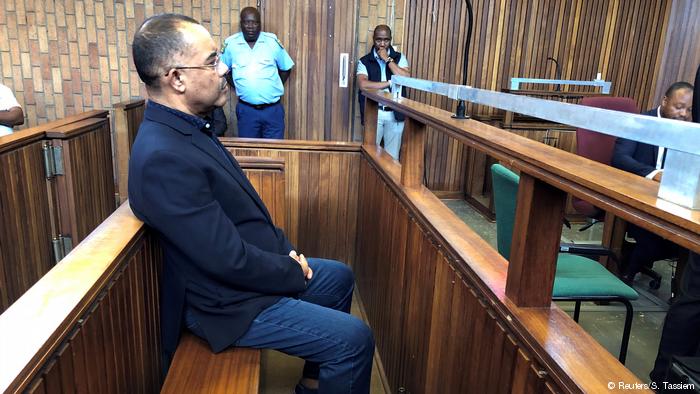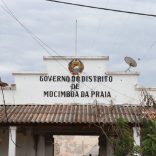Mozambique: 300 terrorists have surrendered to authorities in Mocímboa da Praia recently - report
Is the decision on extradition of Manuel Chang in the hands of justice or politics?

File photo. DW
In the final stages of the extradition process of former Mozambican finance minister Manuel Chang, there is concern that there may be political interference in the South African court.
Both Mozambique and the United States are putting pressure on the South African government to favour the extradition of Manuel Chang to their respective territories. Although South Africa’s justice system has a good reputation in Africa for its impartiality, there is a fear that some political interference may occur in this case. And the pressure brought to bear by the two countries in the final phase of the process is not to be overlooked.
South Africa’s Minister of Justice and Prison Services, Tshililo Michael Masutha, has to decide on the order of priority of the court’s analysis of the competing extradition requests. But the US has a strength with South Africa that Mozambique does not have, especially from an economic point of view. In an interview with DW Africa, economist Muzila Nhansale measures the parties against each other.
DW Africa: What is the weight of each of the economies in the dispute over extradition requests?
Muzila Nhansale (MN): First, the relationship between states is based on interests. These are political, economic, and social. But economic interests particularly are what guide the kind of relationship that nations have. South Africa has very strong trade relations with the United States. In particular, not only in the field of technology, in the area of agriculture, with access to markets and a number of privileges that the country has in relation to American capital, while American companies have investments in South Africa in the mining area and in the area energy. Sasol, a lot of people do not know, has a great American presence. Indeed, the weight of economic relations is very strong. But it is also true that South Africa has other economic interests with Mozambique, not only in oil, but also in logistics. South Africa not only has this connection with Mozambique, but it also controls some ports. Mozambique is South Africa’s largest market for its industrial and agricultural production. In terms of the media impact, it is we [Mozambique] who do more of South Africa’s day-to-day life than exactly the opposite. What will really dictate [the outcome] here is this weight and especially strategic future interests.
DW Africa: Do you think that these economic issues could have a great weight to influence the process from the judicial point of view?
MN: It is a commonplace to say that there is a separation of powers [legislative, executive and judicial] and South Africa has at some point already shown that it is a country where this happens. But there are no perfect systems. We had the case of Omar al-Bashir [President of Sudan in 2015, accused of war crimes and against humanity], who can even make a parallel with this one, where there was also an international arrest warrant. But South Africa did not arrest the man and let him go. So it would not be unheard of if it happened again with Manuel Chang. There’s a lot at stake here. And then the South African law is clear on these issues. No one is saying no, the Minister of Justice has the final call. This being the case, we can expect that there has to be a political response tending towards Mozambique.
DW Africa: What would be the repercussions of this for South Africa and Mozambique?
MN: Of course, in the political field, we will have to make some concessions as well. South Africa, in strategic terms for the future, has much to gain from Mozambique in even the short and medium term. I believe our country will have to make some concessions. Until recently, relations with Sasol were not good. And the Government was even thinking about other players for exploration of the light oil in Inhambane. Knowing that the country has serious problems in terms of access to energy products, this could be used as a bargaining chip. These are things that sovereign states never talk about openly or which not public knowledge. But usually there are always trade-offs in such matters.
DW Africa: For example, was this one of the motives that led the Mozambican government to press hard on the South African counterpart, asking for due consideration in the case of Manuel Chang’s extradition?
MN: Naturally, yes, because relations among states are based on interests. Mozambique has the bargaining power over South Africa on strategic issues for them.
DW Africa: This forces the South African authorities to blatantly interfere with the judiciary. Is it an exposure that is not in South Africa’s interest?
MN: In this matter of extradition, it will not necessarily be an intervention. Because it is by the law that the Minister of Justice has a political word to say on the subject. Here it is not an intervention of direct form, to usurp powers. There is this capacity in the law or in this process, where politicians have something to say through the Ministry of Justice. Now, that the legal procedures have to be followed, that the courts have to decide, yes [that is so]. But it’s not the court that has the final call. That’s the difference. These are agreements between states. This (latest) development is an issue where it is very clear, in which there is an article that clearly states that for this type of decision the Minister of Justice has to decide, without harming the merits of the courts. It is for this reason that we are still seeing the courts involved. Otherwise, it would simply be ignoring the court and deciding politically, but that was not the case. It is for this reason that both the prosecution – the Public Prosecution Service – and the defence are wielding their arguments based on the law and also on the very agreement that exists. It is for this reason that Manuel Chang’s lawyers asked for an application for this matter to be settled politically rather than judicially. Because the law confers [this possibility]. Now, it is up to the judge to analyse and see the merits of this application and to decide whether or not the final decision actually passes on to the minister. Otherwise, it will be for justice to respond, but it will not be something unheard of.













Leave a Reply
Be the First to Comment!
You must be logged in to post a comment.
You must be logged in to post a comment.